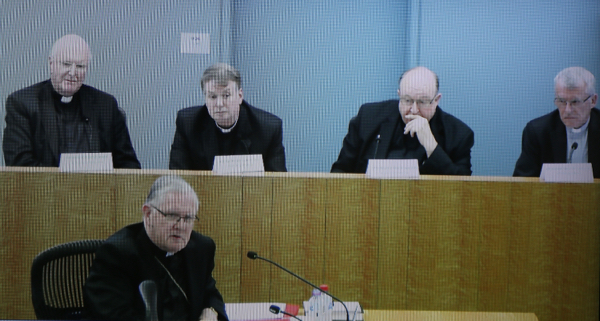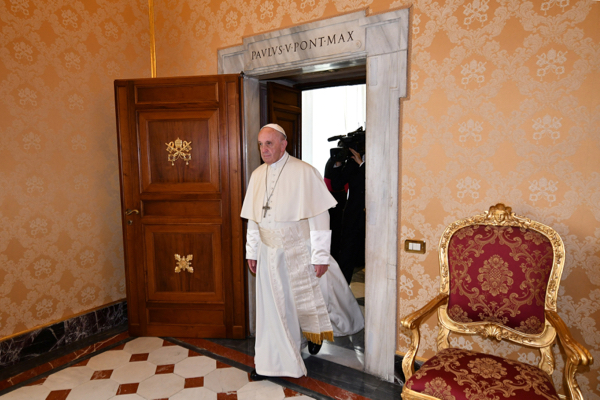It might be one of the world’s smallest sovereign states but the Holy See has a diplomatic network second only to the United States in terms of its global reach.
Now, Pope Francis has established a special department inside the Vatican’s Secretariat of State devoted to overseeing the work of papal diplomats including their selection, career advancement and working conditions. Titled the “Section for the Diplomatic Staff of the Holy See” it will be led by Polish Archbishop Jan Romeo Pawlowski and will act as the equivalent of a human resources department for the roughly 300 priest diplomats who work in the service.
The move is part of Francis’ wider reform of the Roman Curia and a sign of his appreciation of Vatican diplomacy and the work of his ambassadors. At the same time he and the C9 – his advisory body of cardinals - have been looking at the role of papal nuncios, and how to better support and define the role. The creation of the new section also comes three months after the Vatican recalled a diplomat from Washington for suspected child-porn violations.
A letter sent by the Pope on 19 October to Cardinal Pietro Parolin, the Secretary of State, Francis explains he is setting up the new body: “in the conviction that I must assure more fraternal attention and prompter human, priestly, spiritual and professional accompaniment to those who serve in the so-called ‘diplomatic role’ of the Holy See - heads of mission and collaborators – and to those who are preparing for it – students of the Pontifical Ecclesiastical Academy”.
Vatican diplomats are selected from among talented priests who have spent time studying in Rome and are then sent to the prestigious “Accademia” for a period of intensive training during which they are expected to become proficient in numerous languages. Afterwards they are sent abroad on various postings or are asked to work at the Secretariat of State before eventually being ordained as archbishops in order to serve as papal nuncios. While they represent the Pope in any given country they are also tasked with helping draw up shortlists for the appointment of bishops. The role can be varied and exciting but is also demanding and at times lonely with diplomats expected to serve for long periods in cultures very different from their own. It appears that Francis has identified a need to better support them both pastorally and professionally.
The Holy See has diplomatic relations with 183 states and nuncios and their staff must be prepared to serve in danger zones such as Syria and war torn parts of Africa. Papal embassies have a policy of staying in a country regardless of the security situation. In Damascus, Cardinal Mario Zenari is one of the few western diplomats left in the country, while during the 2003 Iraq War and its aftermath the then papal ambassador, Cardinal Fernando Filoni, stayed in Baghdad as bombs fell next to his home. 14 years ago in Burundi, the papal nuncio, Irish Archbishop Michael Courtney, was shot dead in an ambush while driving in the south of the country - he had been attempting to mediate between the government and rebels.
Archbishop Courtney was succeeded by British Archbishop Paul Gallagher, now the Vatican’s foreign minister equivalent, whose residence in the country was bombed in 2008. While there are plenty of stories of heroism among Holy See diplomats there have also been scandals. Along with the recalling of a papal diplomat in Washington there was the case of Archbishop Józef Wesolowski, who died in 2015 while awaiting trial for sex abuse offences.
On the whole, Vatican diplomats conduct their work behind the scenes and out of the limelight. Over the years papal diplomats have played key mediatory roles in Latin American countries and during his papacy, Francis has been credited with helping normalise relations between Cuba and the United States while also helping encourage a peace process in Colombia. This Pope works closely with the Secretariat of State and it has become the Vatican dicastery upon which he relies on most closely. Benedict XVI, who for years ran the other important curial office – the Congregation for the Doctrine of the Faith – at times showed less interest in Church diplomacy and ruffled feathers by appointing a non-diplomat, Cardinal Tarcisio Bertone, as his Secretary of State. While there are cases where prelates have been appointed as papal ambassadors despite not being trained as diplomats, it is a relatively rare occurrence.
The new diplomatic section – which up until now has been the office of the delegate for the pontifical Representations – will co-ordinate with the two other sections inside the Secretariat of State. The first is that of General Affairs, which is led by Archbishop Giovanni Becciu, the ‘sostituto’ who is the equivalent of a deputy Prime Minister and has a crucial co-ordinating role inside the Roman Curia. In his letter Francis points out he will continue to deal with some “general issues” of papal diplomatic postings. The second section is Archbishop Gallagher’s which focussed on relations with states and which the Pope says will retain oversight of “political aspects.”



 Loading ...
Loading ...